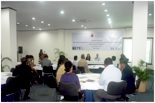Timor-Leste maintained the statute of abiding country at EITI

The Ministry of Petroleum and Mineral Resources (MPMR), through the Secretariat of the Extractive Industries Transparency Initiative (EITI), organized, last September 20th, at Hotel Timor, a seminar to Timor-Leste’s Work Group.
This seminar’s aim was to make known, to this Work Group, the seven requirements’ content of the EITI’s new pattern, aiming to maintain Timor-Leste’s statute as an abiding country.
Timor-Leste integrated the EITI in 2003, becoming an abiding country in 2010, after having fulfilled the requirements, determined in the EITI’s Manual.
The Minister of Petroleum and Mineral Resources, Alfredo Pires, pointed out that “the Government of Timor-Leste is gathering efforts aiming to ensure to their citizens the maximum benefit from the investment and from the management of the mineral resources’ income, transparently and responsibly, through EITI’s implementation mechanism and beyond EITI”.
Alfredo Pires added that transparency and responsibility are reflected in the amounts paid by the oil industry (oil, gas and minerals) to the Government. “The income obtained from those natural resources allows you to create means for sustainable economic development and poverty eradication”, concluded the Minister responsible.
The seven requirements of EITI’s Manual demand the workgroup: to have maximum and effective control; to publish a report at a certain period in time (which contains context information about the extractive industry); that EITI’s report disclosed by the Government is detailed, with complete information on extractive industry’s revenues, as well as the disclosure about oil industries’ payment to the government; that credibility is guaranteed on process application according to international regulations; that the access to EITI’s report is actively promoted and understood by the public, thus contributing for public debate; to take action measures on lessons learned or experienced and that a revision is made on achieved results, through the impacts of EITI’s implementation.
Present at the ceremony were some members of the National Parliament, EITI’s Workgroup, private sector, civil society and media.










































